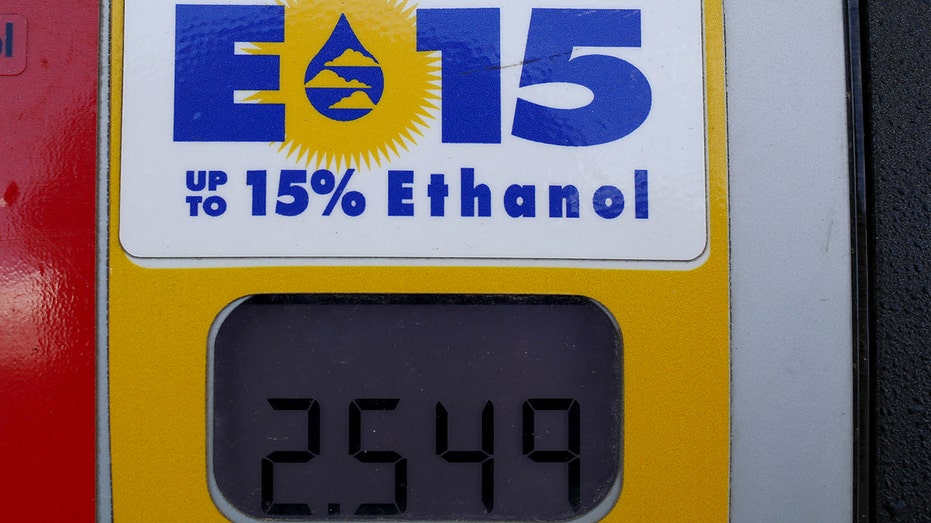US farmers can supply long-term energy and climate solutions
We must expand fuel choices and make ethanol more accessible across the US
Ethanol may bring down gas prices: Sen. Grassley
Iowa Republican Sen. Chuck Grassley discusses how the use of ethanol could benefit the U.S. economy and environment.
Up before the sun rises and into bed long after it sets, farmers spend their days supporting our nation. In fact, in times of crisis, American farmers have always been there to help. During the Civil War, farmers supplied troops with food, clothes and transportation. During World War II, they accelerated production to feed U.S. troops and allies in Europe.
American farmers are stepping up to the plate once again as our nation and the world face an ongoing energy crisis while battling the effects of record-high inflation and tackling climate change.
Although gas prices are beginning to trend downward and AAA’s national average has fallen below $4 per gallon, consumers are still feeling the pinch and some analysts are warning gas prices could climb back to $5 per gallon later this year. With energy costs continuing to be a major driver of inflation, American families remain vulnerable to volatility in energy markets as geopolitical instability in Europe threatens global fuel supplies.

A gas pump displays the price for E15, a gasoline with 15% of ethanol, at a station in Nevada, Iowa, May 17, 2015. (Reuters/Jim Young/File Photo) (Reuters)
Farmers and truckers feel the burden, too. The Agriculture Department estimates that the cost of fuel, lube and electricity combined for American farmers is projected to increase 34% in 2022.
FORMER KEYSTONE XL PIPELINE WORKER SAYS BIDEN, GREEN AGENDA COULD LEAD TO FUEL SHORTAGES
We must remain focused on long-term solutions to diversify the nation’s fuel supply, increase U.S. energy independence and insulate consumers from the volatility of fossil fuels. Ethanol, made from corn produced by American farmers, is key to providing the stability and long-term relief consumers need – all while helping clean up transportation by cutting carbon and tailpipe emissions.
U.S. consumers agree. Recent polling by Morning Consult conducted earlier this year showed 60% of respondents said ethanol can increase America’s energy independence and help the U.S. reach its goal for net zero carbon emissions, while 58% of respondents believe ethanol can help reduce gas prices.
Lawmakers call on Biden to expand ethanol use
FOX Business' Grady Trimble reports from Polo, Ill., where corn farmers are showing support for E15 gasoline to be available year-round.
Indeed, ethanol has been priced as much as $1 less per gallon than unblended gasoline at the wholesale level, and drivers have been saving upwards of 30 cents or more per gallon where retailers offer the choice of E15. The science is on our side: Analysis from the Department of Energy’s Argonne National Laboratory finds today’s ethanol results in up to 52% fewer GHG emissions than gasoline.
Ethanol already adds billions of dollars of gallons to the U.S. fuel supply, offsetting demand for high-cost oil, supporting cleaner air and increasing the total fuel available to consumers. But we can and should do more to expand fuel choices for consumers and make ethanol more accessible across the country.
GAS PRICES SHOULD KEEP FALLING IF WE CAN AVOID THE ‘PERFECT STORM’: GASBUDDY ANALYST
We are making progress, and the proof is at the pump with the savings consumers found this summer with E15, marketed as Unleaded 88 by many leading retailers. Rather than allow litigation to block consumer choice, EPA used common sense and maintained market access for low-cost, low-emission E15 this summer. The House of Representatives also passed legislation to fix this outdated fuel rule, putting the ball in play for the Senate to finally bring policy up to date with science and drivers.
Pressure on oil market will continue to drive gas prices down: Energy expert
Lipow Oil Associates president Andy Lipow provides his outlook on the oil market, telling 'The Claman Countdown' he expects gas to drop to $3.50 per gallon by October.
Looking ahead and learning from the volatility in prices, we need to take further steps for longer-term energy security. A bipartisan group in Congress, led by Sen. Chuck Grassley, R-Iowa, in the Senate and Rep. Cheri Bustos, D-Ill., in the House, are pushing for the Next Generation Fuels Act. This legislation would increase our fuel supply through expanded use of low-carbon ethanol to improve engine efficiency, cut emissions and offer consumers more choices to save money at the pump.
GET FOX BUSINESS ON THE GO BY CLICKING HERE
The Next Generation Fuels Act is the kind of innovative solution that can help address both our energy and climate challenges. Without better fuel in the marketplace, automakers can’t deploy the advanced engine designs that make vehicles more fuel efficient and cut emissions, ultimately reducing choices for drivers.
This is a commonsense step to shore up our energy security for the long run, through cleaner fuels and vehicles that work together to provide more diverse and affordable solutions to consumers as our nation transitions to cleaner transportation. Blending more low-carbon, low-cost ethanol makes these advanced fuels and vehicles possible.
CLICK HERE TO READ MORE ON FOX BUSINESS
Through war, economic downfalls, global pandemics and now an energy and climate crisis, farmers always rise to the challenge. By expanding ethanol choices at the pump, we can not only make everyday life more affordable for Americans—we can make meaningful environmental progress by taking greater advantage of our renewable resources from rural America.























